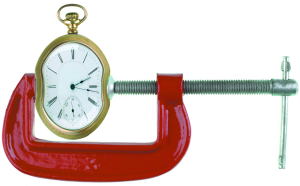My dad, Johnny Nagel, a common sense, hard-working man with entrepreneurial wisdom beyond his sixth-grade education, had a sign posted on the door of his makeshift office. It read…
If you don’t have time to do things right the first time, how much time do you have to them over?

As a diesel mechanic in a small, farming community, grain farmers relied on Dad to deliver their hay balers, combines, and tractors within a suitable timeframe. Due to North Dakota’s limited growing and harvesting season, the speed of return to the grain fields was critical.
With a demand to finish harvest before the cold, hard Dakota winters set it, Dad felt the pressure to deliver machinery, often before it was fully repaired and ready.
“Good enough” was not good enough for Dad’s approach to the service he committed to providing.
Although it was difficult for harried farmers to see the value of making proper repairs from the outset, Dad’s commitment to quality work ultimately prevented costly delays for his clients.
His attitude and approach to business were the first, and the most influential, lessons I learned as an entrepreneur. It inspired me to deliver quality work with the utmost integrity — not just occasionally — but time and time again.
The High Cost of Entrepreneurial Blunders & Missteps
In a rush to get to market, we hurry through our business planning process. We tell yourselves we don’t have time! Yet, our perceived time crunch causes a failure to identify critical strategies. This blunder ultimately triggers a flurry of costly marketing mistakes and the need to take up the planning process once again.
How much time (and money) do we have to do things over?
We sprint through research overlooking vital statistics that would accurately position our offerings. We don’t have time — or so we tell ourselves! Following months of lackluster results, this fundamental mistake forces us to realign our products. Yikes!
How much time (and money) is it going to take to do things over?
Corners are cut on a critical project for a high-profile client. This ultimately doubles your project overhead and drastically reduces your profit. Why? We didn’t have time to do things right from the inception — or so we tell ourselves. Not only does this create grounds for the loss of future contracts but puts a permanent dent in our reputation.
How much time…oh, never mind. There’s no do-over when delivering less-than-expected results to a client.
Certainly, interpreting ‘doing things right the first time’ is left to the individual. Whether it’s our planning process, client promises, or work quality, when we find ourselves unreasonable rushing or struggling, remember the philosophy of my Dad, Johnny Nagel — “if you don’t have time to do things right the first time; how much time do you need to do things over?”
This simple, yet profound approach to business saves us from costly mistakes and unnecessary stress.


